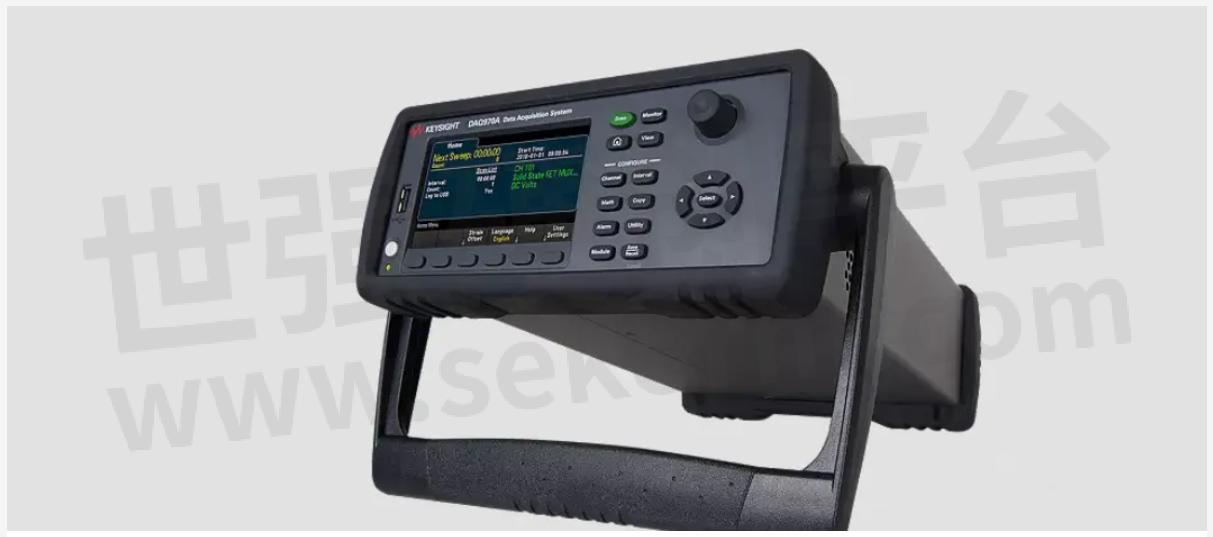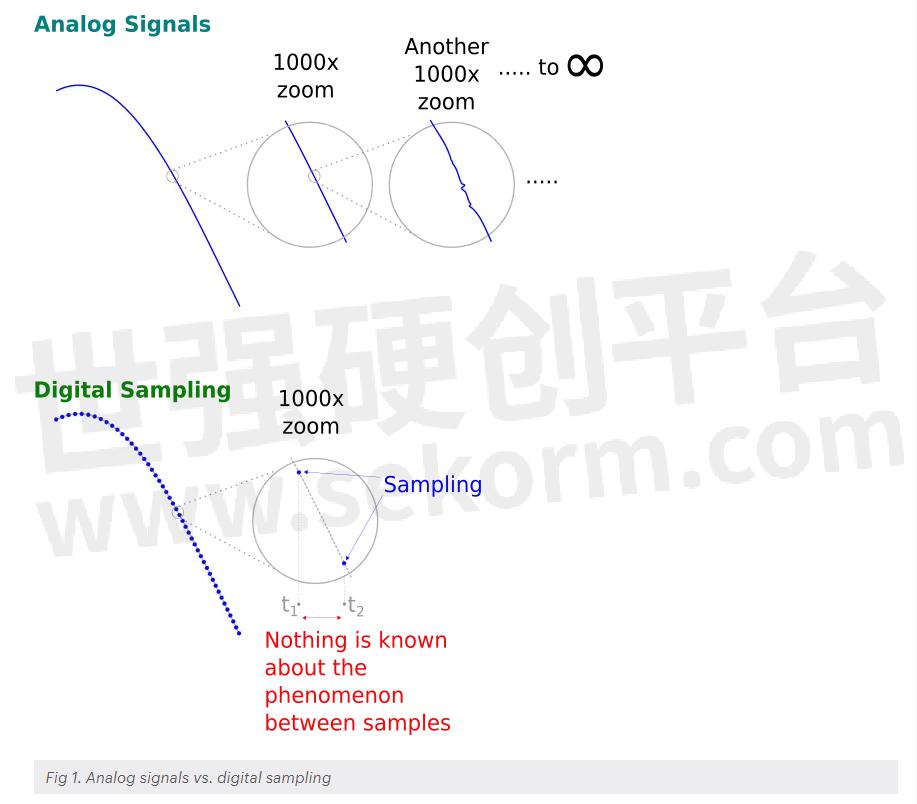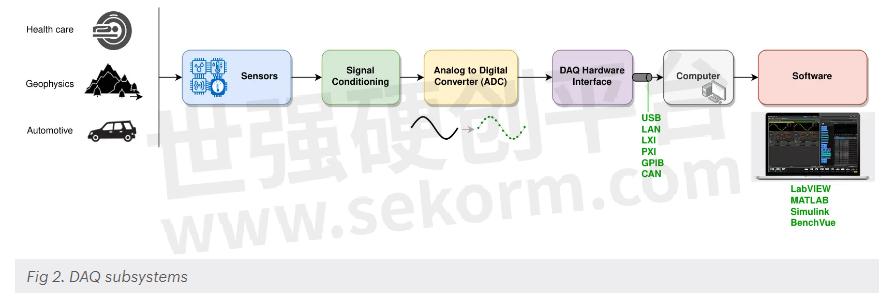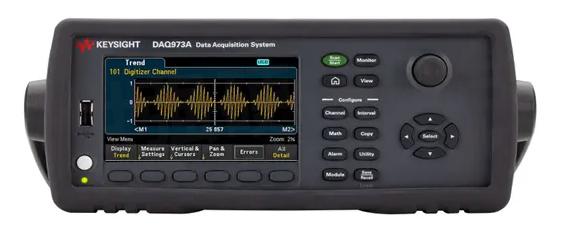Scale Up Your Measurements With DAQ Systems





When an engineer is asked to measure one device, it's easy enough. But what do they do when they're asked to measure an entire assembly line of devices?
High accuracy and high scalability are both necessary for streamlining the test and measurement process in environments like manufacturing or power supply where time is critical and can't be wasted.
Data acquisition (DAQ) systems enable this kind of efficiency. In this article, you’ll:
· get an overview of DAQ
· learn how it works under the hood
· find out how to apply it effectively
What is data acquisition?
Data acquisition refers to the process of measuring some aspect of a real-world physical phenomenon by first sensing it as an analog electrical signal, then sampling it regularly at discrete intervals of time, and finally quantizing it to obtain digital numeric values with finite precision that can be stored in a computer for data analysis.
Why is DAQ used?
Take your smartphone as an example: It receives and transmits radio waves. The amplitude, frequency, power, and phase of a wave are all analog phenomena that can smoothly vary between a minimum and a maximum value with an infinite precision of decimal places.
For example, the power of the wave reaching your phone may take any decimal value between -50 to -110 decibel-milliwatts (dBm) to an infinite precision. In addition, you can think of time also as consisting of an infinite number of instants. So if you want to very accurately measure the wave's power over time, there's theoretically no limit to how precisely and how frequently you can do so.

However, our computers and processors are fundamentally digital and cannot handle infinite precision or frequency. So for convenience and practicality, we use a DAQ system to sample (measure) such phenomena at regular intervals of time and convert them to fixed-precision numeric values that our digital computers can store and analyze.
In addition, DAQs make testing streamlined and scalable. Interestingly, DAQ is quite generic. Once you convert a phenomenon to an analog signal with a suitable sensor, the rest of DAQ is quite similar regardless of the phenomenon you're measuring. So DAQ is not just an abstract workflow but something that can be productized and reused across industries and use cases.
What are some scientific and industrial applications of DAQ?

DAQ systems enable the scaling up of testing. Let's look at some interesting uses of DAQs.
· Acoustic analysis: DAQs are used for identifying possible faults in machines and engines by measuring their acoustic characteristics.
· Health care: Some uses of DAQs in health care include magnetic resonance imaging, nuclear magnetic resonance spectroscopy, and biotechnology use cases like phylogenomics.
· Geophysics: DAQs are used for geophysical applications like measuring the geomorphology of an area and collecting seismic data.
· Automobiles: DAQs are used extensively for automotive performance measurements like bulk testing of battery temperatures and automated production line testing of vehicle electronic control units.
What are the types of DAQ equipment?
There are three types of DAQ equipment.
· Data loggers: These are a kind of stand-alone equipment that are typically portable and suitable for field use. They come with built-in processors for data processing and analysis, pre-installed software with minimal capabilities, and rudimentary displays. For example, data logging for voltage measurements or power measurements is available for use across industries and use cases.
· DAQ devices: Data acquisition devices are modules that have general-purpose DAQ hardware, such as multiplexers, counters, totalizers, analog/RF input switches, digital input/output, and digital-to-analog outputs, but not processors or software. These modular devices are designed to attach to different computers and work with different DAQ software.
· DAQ systems: Data acquisition systems are configurable high-speed systems with high channel counts for complex use cases.
What are the main components of a DAQ system, and how do they work?
All DAQ systems consist of the six subsystems shown in this illustration:

We'll explain each subsystem below.
1.Sensors
The sensor subsystem consists of devices or circuits that sense different phenomena and convert them to analog electrical signals like voltages or currents. Sensors are often transducers because they convert phenomena that involve one kind of energy (like kinetic or thermal) into electrical energy.
We first look at some important aspects of this subsystem.
What are some key considerations in the sensor subsystem?
Phenomena like noise and interference adversely affect the accuracy of the analog output of a sensor. It's often a result of how the sensing is done. It can be one of the following two common ways.
· Single-ended analog signals: In single-ended measurements, the signals are measured against a common ground level. However, since the ground level itself is vulnerable to interference (for example, from the device's power supply), this technique can result in a lot of noise and is unsuitable for use cases where the signal and noise are of the same order of magnitude.
· Differential analog signals: In this approach, the phenomenon is measured through two signals — the primary signal and its own inverted signal through another wire. The difference is treated as the analog signal value. The advantage is that since noise and interference are likely to similarly influence both wires, their difference automatically ensures low noise.
What are the types of sensors used with a DAQ?
Common sensors include:
· Temperature measurement sensors: Sensors to measure temperature include thermocouples, thermistors, and resistance temperature detectors (RTDs).
· Pressure sensors: Pressure sensors like strain gauges convert pressure into a change in resistance or capacitance.
· Force measurement sensors: They include devices like load cells.
· Motion and position sensors: Sensors like accelerometers and gyrometers measure linear and angular motion.
· Light sensors: Optical sensors include photodiodes as well as image sensors like charge-coupled devices and complementary metal-oxide-semiconductors (CMOS) sensors.
· Sound sensors: Microphones and decibel meters convert sound energy into electrical energy.
2. Signal conditioning
The raw analog output of a sensor is often unsuitable for the downstream stages. To improve its quality, signal conditioning is applied using suitable circuits. Common conditioning techniques include:
· amplification to boost signal power
· attenuation to reduce signal levels
· filtering to remove unwanted frequencies in the waveforms
· isolation to protect from high voltages or currents
· linearization to correct the nonlinear responses of sensors
· current or voltage excitation to supply electrical energy to sensors and make them generate measurable electrical signals
The prerequisite for signal conditioning is proper device calibration to ensure the accuracy and reliability of measurements.
The analog output is now ready for conversion to a digital form in the next subsystem.
3. Analog-to-digital converters (ADCs)
ADCs are integrated circuits that sample analog signals at regular intervals and output numeric, often integral, values. The sampling rate depends on the limitations of the sensor as well as the use case.
ADCs are characterized by the digits of precision. A 12-bit ADC can output 4096 (212) values ranging from 0 to 4095. These are more values to represent a measured range compared to a 10-bit ADC and therefore higher precision.
4. DAQ hardware for computer interfacing
The conditioned signal is transmitted to an external computer or a built-in processor through many communication buses like:
· ethernet
· controller area network
· peripheral component interconnect (PCI) extensions for instrumentation
· industrial USB DAQ
· local area network (LAN) extensions for instrumentation
· general purpose interface bus
Each of these has different latency and reliability characteristics.
5. Computer
The computer receives the digital data via the above buses and uses specialized software to store and manage them.
6. DAQ software
The DAQ software running on the computer plays a significant role in the measurement process. These software are bundled with algorithms and implementations capable of different types of DAQ data processing.
Several data acquisition software environments with their own domain-specific programming languages are popular for implementing data acquisition applications, including:
· LabVIEW
· Maximum Integrated Data Acquisition System (MIDAS)
· MATLAB
· Simulink
· PathWave BenchVue
General-purpose programming languages like Python, C, and C++ with DAQ-specific libraries are also commonly used for real-time data collection, data analysis, and measurement applications.
What are the key characteristics when selecting a DAQ system for a specific application?
Some key aspects to consider before selecting a DAQ for an application include:
· Sensors and measurands: Verify that the sensor specifications are suitable for your DAQ use case.
· Number of channels: Analyze how many concurrent input and output channels you need.
· Sampling rate: Keeping the Nyquist limit in mind, ensure that the sampling rate is high enough to capture the details you need.
· Input and output rates: Check that the sensors and ADCs meet your input and output rate expectations.
· Power requirements: Analyze the power needs of the DAQ system.
· Software compatibility: Does the DAQ work with the software your team or department is proficient in?
However, technical characteristics are only a part of the picture. You must also look at the business aspects.
How to streamline your test processes and save costs with a DAQ
You can improve the return on investment (ROI) of DAQ through several strategies.
· Use switches: Switching hardware enables multiple sensors to connect to the same measuring device or to route signals to multiple devices. Switches enable the efficient and economical use of measurement hardware. They also enable closed-loop automated test systems by routing power and enabling measurements.
· Choose the right types of switches: Different types of switches like relay, armature, and solid-state allow for different wear and tear depending on the load they carry. Add suppression circuits to limit in-rush currents. Include resistor-capacitor networks to reduce transient voltages and clamp voltages.
· Group by measurement types: Group similar measurement functions together. For example, group all the thermocouple measurements together and all the voltage inputs together. This reduces function changes and configuration errors when the DAQ system is scanning.
· Group by input levels: Streamline the DAQ by grouping measurements of the same input levels. This reduces the time lost in range changes.
· Isolate your inputs: Isolated inputs reduce noise, break ground loops, and enable higher accuracy. Also, separate your analog and digital grounds.
· Use a distributed DAQ system: A distributed system has several benefits over a centralized system, such as shorter sensor wiring, redundancy against failures and faults, and localized signal conditioning for a smaller number of sensors.
Streamline your testing with KEYSIGHT DAQ systems

In this article, you explored how DAQ systems work and why you should use them for your measurements. Keysight has decades of experience in building highly reliable, industrial-strength DAQ systems. keysight extensive portfolio of DAQ systems covers a variety of form factors, capabilities, and interfaces.
- |
- +1 赞 0
- 收藏
- 评论 0
本文由雪飘梦飞转载自Keysight Blogs,原文标题为:Scale Up Your Measurements With DAQ Systems,本站所有转载文章系出于传递更多信息之目的,且明确注明来源,不希望被转载的媒体或个人可与我们联系,我们将立即进行删除处理。
相关研发服务和供应服务
相关推荐
How Data Acquisition Helps Your Quality Assurance
There‘s certainly no dearth of variety when it comes to electronic test and measurement devices. From general-purpose instruments like multimeters and oscilloscopes to highly specialized equipment for specific industries, there is a correct tool for every need. However, there is one group of test devices that stand tall in this crowded field because of their power and versatility. They are the data acquisition systems. In this article, find out what makes them so special, which industries use them, and how they work.
Efficient AC-DC Converter for Automobiles
As electric and hybrid vehicles become more popular, the need for efficient AC-DC converters in automobiles becomes increasingly important. These converters are responsible for taking the alternating current (AC) produced by the car’s battery and converting it into direct current (DC) that is used to power the car’s electronic components. In this article, we will explore the importance of efficient AC-DC converters in automobiles and discuss some of the latest advancements in this technology.
DHT20湿度和温度模块数据表
描述- DHT20是一款高精度湿度温度传感器模块,采用数字I²C输出格式。它具有优越的传感性能,典型相对湿度误差±3%,温度误差±0.5℃。该产品经过完全校准和处理,支持宽电压范围(2.2至5.5V直流),并具备良好的长期稳定性和抗干扰能力。
型号- DHT20
AHT20 Integrated Temperature and Humidity Sensor with 3x3mm Bottom, I²C Interface
ASAIR lauched an new integrated temperature and humidity sensor AHT20, which has established a new standard in size and intelligence. It is embedded SMD package with a bottom of 3 x 3mm and a height of 1.0mm.
How to Buy Temperature and Humidity Sensors?
In the broad application of products, many users do not grasp the precautions when using the products they purchased, resulting in inaccurate measurement data when using the products to detect temperature and humidity. ASAIR will tell you how to buy it.
AHT21B湿度和温度模块数据表
描述- AHT21B是一款具备数字I²C输出的湿度温度传感器模块。该产品采用新型ASIC专用芯片、改进型MEMS半导体电容式湿度传感器组件和标准片上温度传感器组件,具有优越的传感性能,典型精度为RH±3%,T±0.5℃。它支持宽电压范围2.2至5.5V DC,并具有良好的长期稳定性、快速响应能力和抗干扰能力。
型号- AHT21B
AM2315C湿度和温度模块数据表
描述- AM2315C是一款高精度湿度温度传感器模块,具有数字I²C输出。该模块采用全新设计的ASIC芯片、改进的MEMS电容式湿度和标准片上温度传感器,性能和可靠性得到显著提升。它支持宽电压范围(2.2至5.5V直流),具备良好的长期稳定性和快速响应抗干扰能力。
型号- AM2315C
AM2301B湿度和温度模块数据表
描述- AM2301B是一款高精度湿度温度传感器模块,具备数字I²C输出。该模块采用新型ASIC专用芯片、改进型MEMS电容式湿度和标准片上温度传感器,具有优异的性能和稳定性。它支持宽电压范围(2.2至5.5V DC),适用于多种环境下的温湿度检测和控制。
型号- AM2301B
AM2108湿度和温度模块数据表
描述- AM2108是一款具有数字I²C输出的温度和湿度复合传感器。它采用专用数字模块采集技术和RH&T传感器技术,确保高可靠性和卓越的长期稳定性。该模块输出校准后的数字标准I²C信号。AM2108配备全新设计的ASIC专用芯片、改进的MEMS半导体电容式湿度传感器元件和标准的片上温度传感器元件。其性能达到行业先进水平。
型号- AM2108
Keysight(是德科技)测试仪器分销产品选型指南(英文)
目录- BenchVue Control and Analysis Software RF Bench and Handheld Instruments Handheld Spectrum Analyzers FieldFox Handheld Analyzers Spectrum Analyzers, Signal Analyzer Audio Analyzer and Signal Generator Power Sensors and Power Meters RF and Microwave Test Accessories Vector Network Analyzers and ECal Modules Essential Bench Oscilloscopes, Applications, and Probes Digital Multimeters Function/Arbitrary Waveform Generators Data Acquisition/Switch Units USB Products and Connectivity Frequency Counters/Timers Power Supplies Bench Power Supplies System Power Supplies Precision Power Supplies System Power Supplies(continued) DC Power Analyzer, SMUs, and DC Electronic Loads AC Power Sources LCR Meters Handheld Instruments
型号- U8480,B2911A,U1272A,N8926A,34460A,N7040A,U8000,N9340B,53140,N5742A,N5766A,34905A,N9918A,N6735B,N8480,N5743A,N5767A,N1914A,3024T,3012T,U1273A,34904A,N6746B,N6734B,U3800,U1282A,N8948A,34470A,N7042A,N1913A,N5744A,N5768A,34903A,N8924A,N9916A,N9928A,34939A,N6701C,N8949A,U1271A,N8925A,N8937A,N7041A,N1912A,N9000B,N5745A,N5769A,N2819A,3022T,3034T,N6700C,34902A,N9917A,34938A,N6736B,U1600,8491A,DSOX1102G,DSOX1102A,N9320B,P-SERIES,33509B,N7020A,N1911A,N9344C,N5746A,N3302A,N2818A,34901A,34937A,U1701B,82357B,U1273AX,U2802A,N5181B,N2142A,U1281A,B2902A,4024A,N5747A,N3303A,8490G,N2805A,3032T,N6702C,U1700,N6705C,N8928A,N9342C,33519B,B2901A,N3304A,N5748A,34947A,N2804A,N8929A,N5171B,N9343C,N2140A,X-SERIES,B2912A,N3305A,U8903B,N5749A,4022A,34934A,4034A,34946A,8480D,3054T,U2702A,N3306A,U1733C,U1210,U2300,N5700,34945A,3458A,TU1453A,U2701A,B2962A,1146B,N3307A,1147B,N7026A,33600A,33612A,B2961A,N9322C,N9310A,U1731C,2002A,53200,2014A,3104T,U1610A,U2723A,33611A,2004A,U1732C,J7205A,34942A,U3606B,53210A,J7205B,U2722A,N1810UL,33622A,3102T,34941A,N8760A,2012A,2024A,U2500,U1620A,33512B,33500B,33621A,N1810TL,3004A,N6700,N6705,N8761A,N2821A,33511B,N3300,4104A,2022A,N2820A,U2600,33510B,33522B,3014T,N2843A,E36100B,33521B,N9962A,87106D,AC6804B,E4982A,DAQM905A,34950A-34959A,N6750,N9950A,N8740A,E36103B,U2020,EDUX1002A,N9951A,33520B,N7007A,83050A,N2962A,53131A,P9243A,E4981A,U2741A,34972A,E36102B,J7211B,J7211A,J7211C,E36320A,N8741A,AC6802B,DAQM903A,U1270,N9960A,E36311A,N8762A,E36105B,N6781A,U2000,E3641A,EDUX1002G,N2863B,AC6803B,DAQM904A,N8900,U1280,84904L,U2751A,34970A,N9961A,B2900,E36104B,E3640A,AC6800B,N2862B,6002A,E3600,E-SERIES,E36313A,DAQM900A,U1250,U5850,N8756A,N8732A,N8950A,AC6801B,10070D,DAQM902A,U2761A,34980A,E36300A,E36312A,N6782A,DAQM901A,E36106B,53220A,N8757A,87222D,N8733A,N8951A,87222E,N9952A,87104D,P9242A,E4980A,6004A,53132A,N6785A,N6773A,U1452A,B2980A,N6761A,N8754A,N8742A,P9241A,N2871A,53230A,N8700,N4985A-S50,U1240,N6784A,E4981A-001,E4981A-002,N8755A,U1453A,N8731A,N2870A,8495D,N2797A,87405B,N2894A,N5770A,8495B,87405C,34420A,E3647A,10833F,34921A-25A,10833G,10833A,10833B,4154A,10833C,10833D,N6775A,U1450A,N8736A,N6763A,U1232A,N8954A,N6751A,N8930A,N7550,N9923A,N2796A,N9935A,N2893A,N5771A,E36100,E3646A,6811C,N4985A-S30,4032A,N8737A,N6786A,N6774A,N8943A,N6762A,E5063A,10834A,N8955A,U1451A,8494G,N8931A,E3634A,U1233A,3052T,N2783B,P9371A,N2795A,N5772A,6813C,E3649A,6800C,6812C,N6753A,N8758A,U1460A,N6741B,U1242C,N8734A,U1242B,N8952A,N6777A,N8940A,N6765A,P9370A,N2891A,N2782B,EPM SERIES,53181A,N5761A,34931A-33A,34465A,E3648A,4054A,N8759A,N6764A,U1231A,U1461A,N6752A,E9320,83020A,N8735A,N8941A,N6776A,N2793A,DAQ970A,N2890A,L2060,N2781B,U1240C,N9914A,82350C,N5750A,N5762A,U2063,E5810B,N8934A,N6743B,N9926A,P1912A,N8946A,N6731B,N9938A,U1252B,E3643A,E3631A,N6755A,14585A,N2792A,N2780B,U1241C,N5763A,E4980AL,N5751A,E36300,E9300,N8923A,N9915A,N8935A,N6742B,N9927A,E3630A,U1241B,4052A,U1253B,E3642A,N6766A,34908A,N6754A,N2791A,N9912A,N8738A,N9936A,U1190,U2040,N5752A,N5764A,34450A,DAQM907A,N8932A,N8944A,34907A,N8920A,E3645A,N6745B,E3633A,N6733B,L2050,N2790A,U1251B,N8739A,N9913A,N9925A,N5741A,DAQM908A,N5765A,34461A,U2053,N8945A,N6732B,N9937A,N8957A,N8921A,E3632A,E3620A,N6756A,E3644A,N6744B
Keysight(是德科技)数据采集系统和开关解决方案产品选型指南
目录- DAQ970A / DAQ973A Data Acquisition System and Modules 34980A Data Acquisition System and Modules USB Data Acquisition Mainframe and Modules
型号- DAQ970A,U2354A,DAQM905A,DAQM909A,U2653A,34941A,U2300,DAQM900A,34921A,34945A,34933A,34925A,34937A,DAQ973A,U2802A,U2781A,U2353A,DAQM902A,U2652A,34980A,U2300 SERIES,34945EXT,34952A,34932A,DAQM901A,34924A,U2651A,U2352A,DAQM903A,U2356A,DAQM907A,U2600 SERIES,34951A,34931A,34923A,34947A,34959A,U2600,34939A,DAQM904A,U2331A,U2351A,DAQM908A,U2751A,U2355A,34950A,34942A,34934A,34922A,34946A,34938A
Keysight DAQ970A和DAQ973A数据采集系统
描述- Keysight DAQ970A和DAQ973A数据采集系统具备高精度切换和内置先进的6½位DMM,可准确测量。系统支持自动校准,以补偿内部DMM或DAQM907A多功能模块或DAQM909A数字化模块因时间和温度变化引起的漂移。系统可测量极低电流范围(1 µA DC和100 µA AC)和更高电阻范围(1000 MΩ)。系统具有高达450通道/秒的扫描速率,每系统最多120个通道,并支持测量和转换14种不同的输入信号。系统配备大型4.3英寸彩色显示屏,便于设置和查看数据,并支持LAN和USB连接。
型号- DAQ970A,DAQ973A,DAQM904A,DAQM905A,DAQM902A,DAQA194A,DAQM903A,DAQM908A,DAQM909A,DAQA191A,34970A,DAQA190A,DAQM907A,34972A,34307A,DAQM900A,DAQM901A,34308A
CLC1200仪表放大器
描述- CLC1200是一款低功耗、通用型仪表放大器,具有1至10,000的增益范围。该放大器采用8引脚SOIC或DIP封装,只需一个外部增益设置电阻,使其比离散的3放大器设计更小、更容易实现。CLC1200具有低至6.6nV/Hz的输入电压噪声和0.2μVpp的噪声,适用于数据采集系统。
型号- CLC1200,CLC1200ISO8X,CLC1200ISO8MTR,CLC1200ISO8EVB,CLC1200IDP8
现货市场
服务
提供是德(Keysight),罗德(R&S)测试测量仪器租赁服务,包括网络分析仪、无线通讯综测仪、信号发生器、频谱分析仪、信号分析仪、电源等仪器租赁服务;租赁费用按月计算,租赁价格按仪器配置而定。
提交需求>
朗能泛亚提供是德(Keysight),罗德(R&S)等品牌的测试测量仪器维修服务,包括网络分析仪、无线通讯综测仪、信号发生器、频谱分析仪、信号分析仪、电源等仪器维修,支持一台仪器即可维修。
提交需求>































































































































































































登录 | 立即注册
提交评论